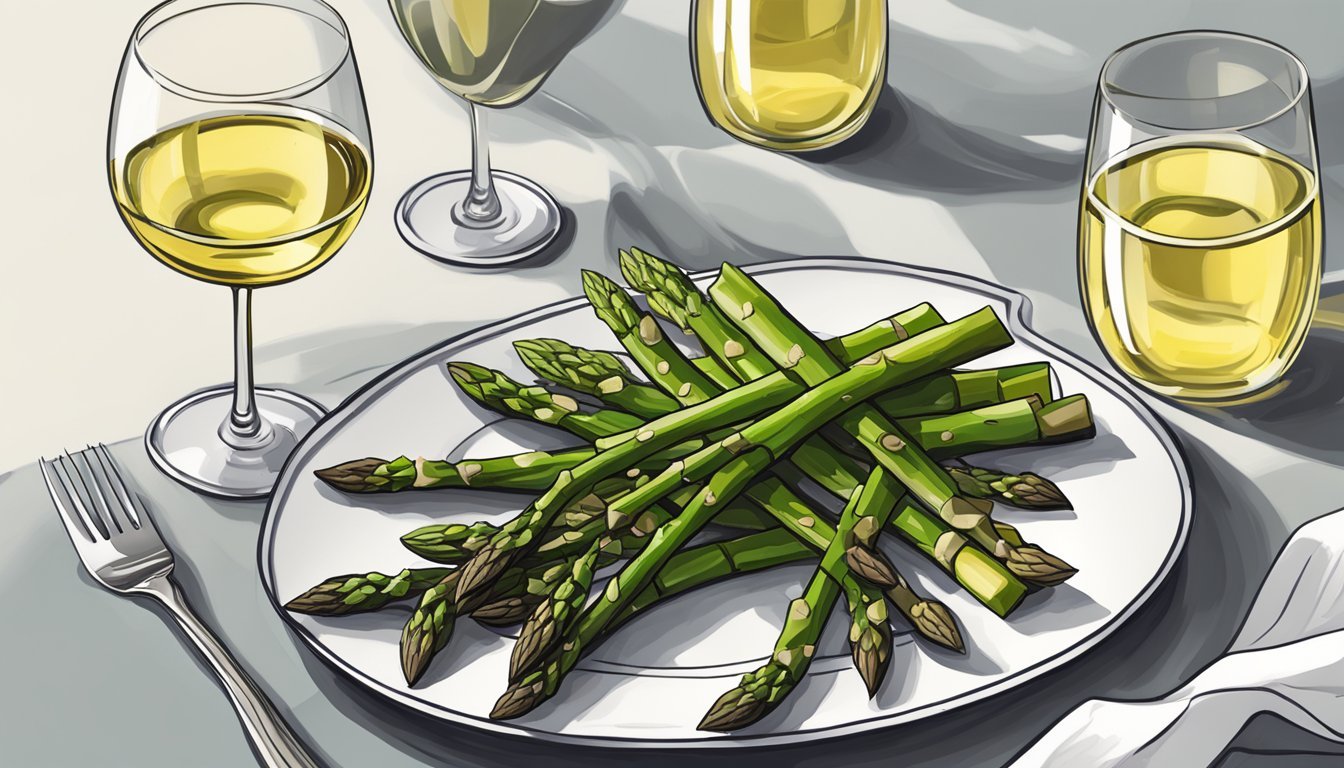What Wine Goes Well with Grilled Asparagus?
Pairing Tips for Your Spring Menu
Grilled asparagus (What wine goes well with grilled asparagus?) is a staple in springtime cuisine, offering a balance of smoky flavor and tender crunch. When it comes to wine pairing, the unique taste of asparagus (What wine goes well with asparagus?) can present a challenge, but the right choice enhances both the dish and the drinking experience. Selecting a wine that complements the earthy, charred notes of grilled asparagus without overpowering its delicate flavor is key.
Light-bodied white wines are generally well-suited to pair with grilled asparagus. Varietals like Sauvignon Blanc stand out due to their herbaceous and citrusy notes, providing a refreshing contrast to the smoky vegetable. Similarly, wines such as Albariño and Grüner Veltliner, known for their crisp acidity and green fruit characteristics, offer a harmonious match with asparagus' grassy undertones.
The goal is not merely to accompany the dish but to elevate it, drawing out asparagus's natural flavors. A well-paired wine will echo the subtle notes of the asparagus and may even introduce complementary aromas, such as fruity or floral accents, without overwhelming the vegetable's essence. Therein lies the art of asparagus wine pairing—finding a bottle that resonates with the grilled spears and provides a well-rounded dining experience.
Understanding Asparagus
Navigating the intricacies of asparagus will enhance one’s food pairing choices, particularly when it comes to selecting a wine that complements the distinct characteristics of this vegetable when grilled.
The Basics of Asparagus
Asparagus is a perennial spring vegetable known for its tender shoots and distinct earthy taste that can bring a fresh, verdant quality to the plate. It's categorized scientifically as part of the lily family and is appreciated for its versatility in cooking and its nutrient-rich profile, containing essential vitamins such as Vitamin K and folate.
Asparagus Varieties
While green asparagus is most common, boasting a vibrant color due to the presence of chlorophyll, white asparagus and purple asparagus offer unique alternatives. White asparagus, grown without sunlight to prevent the development of chlorophyll, has a milder flavor and more delicate texture. Purple asparagus tends to have a fruitier undertone but turns green when cooked.
Cooking Methods: Grilling Asparagus
Grilling asparagus can enhance its natural flavors, adding a smoky essence and a charred texture that complements its inherent earthiness. To grill asparagus:
Preheat the grill to a medium-high heat.
Trim the tough ends of the asparagus.
Toss the spears in oil with seasoning.
Place them on the grill, turning occasionally, until tender with slight charring.
Seasonal Aspects of Asparagus
As a quintessential spring vegetable, asparagus is at its peak from February to June, when it is most flavorful and abundant. Asparagus's prime season is when its texture is optimal—crisp yet tender—and its taste profile balances vegetal sweetness with a hint of bitterness. This seasonal context is crucial when considering wine pairings, as the freshness and flavor profile of the vegetable will influence the choice of wine.
Selecting the Right Wine
When pairing wine with grilled asparagus, the goal is to complement the vegetable's natural flavor without overpowering it. A suitable wine should balance the smoky and earthy notes of the asparagus, enhancing the overall dining experience.
White Wines for Asparagus
Grilled asparagus pairs exceptionally well with certain white wines known for their crispness and refreshing acidity. Sauvignon Blanc serves as a top choice; its vibrant flavors and herbaceous notes harmonize with asparagus's green and smoky qualities. Similarly, Pinot Grigio offers a light-bodied profile that doesn't overshadow the delicate taste of the vegetable. For those who prefer a hint of sweetness, a dry Riesling can provide a lovely contrast with its subtle fruity notes.
Recommended White Wines:
Sauvignon Blanc: Crisp, herbaceous
Pinot Grigio: Light-bodied, subtle
Riesling: Dry, slightly sweet
Red Wines with Asparagus
Although not as common, certain light-bodied red wines can still work with asparagus. Steer clear of full-bodied, rich reds, as they tend to clash with asparagus. Instead, opt for a Chill Beaujolais or a Frappato, which can bring out different nuances in asparagus without competing on the palate.
Potential Red Wine Pairings:
Beaujolais: Light, fruity, chilled
Frappato: Berry notes, refreshing
Alternative Wine Options
In the case that a typical white or red doesn't suit the occasion, exploring alternative wines can be enlightening. Grüner Veltliner is known for its versatility with vegetables, offering a peppery note that complements asparagus well. Verdicchio, with its hint of almond and refreshing acidity, can act as a wine-friendly option that pairs nicely with the chargrilled edges of the vegetable.
Alternative Wines:
Grüner Veltliner: Peppery, wine-friendly
Verdicchio: Almond notes, crisp acidity
Wine Pairing Principles
Effective wine pairing is an art that enhances the dining experience by harmonizing flavors, textures, and weights of both food and wine. It requires consideration of the way various taste components and the richness of the wine interact with the dish.
Pairing by Flavor Profiles
When pairing wine with grilled asparagus, one must consider the distinct flavor profiles. Asparagus itself has a grassy, earthy taste that demands a wine that can complement without overwhelming. A crisp, Sauvignon Blanc, particularly a Sancerre, is known for its green, herbaceous character that aligns well with asparagus. Alternatively, a Pinot Grigio offers a lighter touch with its subtle fruit notes and refreshing finish.
Sauvignon Blanc: Herbaceous, zestful
Pinot Grigio: Light, fruity
Pairing by Texture and Weight
Texture and weight are also essential factors in wine pairing. Grilled asparagus, often having a slight char and a firmer texture, pairs well with wines that share a similar weight or body. One may choose a light-bodied, acidic wine to counterbalance the smokiness of the grill. A wine that is too rich or tannic can overshadow the dish, making it important to select something more unoaked or delicately structured.
Acidic wines: Enhance flavor, cut richness
Unoaked Chardonnay: Balanced, not overpowering
Considering the Sauce
Finally, the sauce accompanying grilled asparagus can be a pivotal factor in selecting the right wine. A creamy sauce like hollandaise or mayonnaise-based dressings will benefit from a wine with higher acidity to cut through the richness. An unoaked Chardonnay could provide the needed brightness, while its subtle flavors don't compete with the creaminess of the sauce.
Creamy sauces (What wine goes well with creamy sauces?): Require acidic wines
Hollandaise and mayonnaise: Complement with unoaked Chardonnay
Asparagus-Focused Dishes and Wine Matching
Selecting the perfect wine to complement asparagus-centered dishes enhances both the flavors of the wine and the fresh, green notes of the vegetable.
Salads and Lighter Dishes
When it comes to salads featuring asparagus, a zesty Sauvignon Blanc with its crisp acidity is an excellent match. This wine contrasts nicely with the earthiness of the asparagus. For a salad incorporating both fish and asparagus, an Albariño offers herbaceous notes that align well with the greens and a fruitiness that suits the seafood.
Heartier Combinations
Grilled asparagus served with heartier proteins, such as chicken or roast, pairs well with a light Chardonnay. This type of wine can handle the char of grilled asparagus while complementing the meat. In the case of an asparagus risotto, the creamy texture is best accompanied by a Pinot Grigio from Alto Adige, whose crispness cuts through the creaminess without overshadowing the delicate flavor of asparagus.
Cheese Pairings
Asparagus quiche, (What wine goes well with quiche?) particularly when featuring goats’ cheese or parmesan, calls for a wine that can stand up to the depth and tanginess of the cheese. A light-bodied Beaujolais can bring a soft fruitiness to the table without clashing with the quiche. If a salad includes asparagus and shavings of parmesan, a dry Riesling enhances the dish with its subtle stone fruit notes and refreshing minerality.
Global Wine Varieties for Asparagus
When pairing wine with grilled asparagus, one must consider how the wine complements the vegetable's distinct, herbaceous flavor. This section explores European wines with a longstanding tradition of pairing with asparagus, as well as New World wines that offer promising combinations.
European Wines
Austria and Germany are notable for their white wines which pair well with asparagus. Grüner Veltliner, Austria's signature wine, carries peppery notes and green flavors which harmonize with asparagus.
Austria: Grüner Veltliner - Crisp and herbaceous; a classic pairing.
In Germany, Weissburgunder (Pinot Blanc) can be an excellent choice for its balanced acidity and subtle flavors that do not overpower the vegetable.
Germany: Weissburgunder (Pinot Blanc) - Light and refreshing, supporting the asparagus' taste.
Italian Pinot Bianco and Verdicchio from Italy offer similar qualities, with a focus on crisp acidity and minerality.
Italy: Pinot Bianco - Zesty acidity and versatile for asparagus dishes.
Italy: Verdicchio - Mineral-driven with a citrus edge.
France provides several options, from a lively Sauvignon Blanc from Bordeaux to more complex varieties from Burgundy and Champagne regions which can elevate the asparagus experience.
France: Sauvignon Blanc (Bordeaux) - Fresh with grassy notes.
France: Chablis(Burgundy) - Steely and mineral; well-suited for grilled asparagus.
New World Wines
New World wine regions like California, Oregon, and Marlborough in New Zealand have also developed wines that can pair beautifully with asparagus. Sauvignon Blanc from Marlborough is lauded for its vibrant acidity and tropical fruit notes that counterbalance the greenness of asparagus.
New Zealand: Marlborough Sauvignon Blanc - Bright with pronounced fruitiness.
In the United States, Oregon's cooler climate produces elegant whites such as Pinot Blanc, which offers a delicate touch to the fresh flavors of grilled asparagus.
Oregon: Pinot Blanc - Soft, with a gentle fruit profile.
California has its own rendition of Sauvignon Blanc, where the wine develops a fuller body and rich fruit character that can stand up to the charred notes from grilling.
California: Sauvignon Blanc - Hearty with lush flavors.
Preparing for a Wine and Asparagus Experience
Selecting the perfect wine to complement grilled asparagus requires an understanding of both the vegetable's flavor profile and the wine's characteristics. The preparation method of asparagus and the dish it accompanies are key determinants in the wine pairing process.
The Art of Serving
When serving wine with grilled asparagus, one must consider the wine's temperature and the serving sequence. Optimal serving temperatures enhance the wine's bouquet and harmony with the asparagus:
White wines: Serve chilled, between 45°F to 50°F (7°C to 10°C).
Red wines: Slightly chill, around 55°F to 60°F (13°C to 15°C).
In terms of sequence:
Start with lighter wines, progressing to fuller-bodied varieties.
Match the intensity of the wine with that of the dish; a robust grilled asparagus dish may stand up to a richer wine.
Recipes Involving Asparagus and Wine
Certain recipes can elevate the asparagus experience with appropriate wine pairings:
Grilled Asparagus and Salmon:
Recipe: Lightly oil asparagus and salmon, season with salt and grill.
Wine pairing: Choose a white Albariño with citrus notes to harmonize with the salmon and asparagus' verdant character.
Asparagus Wrapped in Serrano Ham:
Recipe: Wrap asparagus with thinly sliced ham, roast until the ham crisps.
Wine pairing: A dry rosé can complement the saltiness of the ham and the earthiness of the asparagus.
Vegetable Medley:
Recipe: Combine grilled asparagus with peas, artichokes, and bell peppers.
Wine pairing: Opt for a Grüner Veltliner, which can handle the medley of flavors, especially with a creamy sauce.
Cooking methods such as roasting, steaming, or boiling asparagus can also influence the wine choice due to the resulting changes in the vegetable's flavor profile. However, with grilled asparagus, one looks for wines that can match the char and smokiness brought on by the grilling process.
Mastering Wine Pairings
When it comes to pairing wine with grilled asparagus, selecting the right wine is crucial to enhance both the flavor of the asparagus and the wine. It requires understanding which wines complement the herbaceous qualities of asparagus and balance its natural freshness.
Educating the Palate for Asparagus and Wine
A person's palate can distinguish a variety of flavors in both asparagus and wine. For a harmonious pairing, one should seek wines that mirror the vegetable's green and slightly earthy notes. Sauvignon Blanc is an excellent option, with its vibrant acidity and herbaceous character, often elevating the taste of grilled asparagus. Regions known for producing distinct Sauvignon Blancs, like Sancerre and Pouilly Fumé, are preferred for their pronounced minerality and citrus undertones.
Another perfect contender is Dry Riesling, which can echo the gentle sweetness found in asparagus while providing a crisp finish. The palate should be trained to notice the subtleties in these wines that resonate with the smoky hints brought forth by grilling.
Difficult Pairings and How to Navigate Them
Grilled asparagus can be notoriously tricky to match with wines due to its strong vegetal flavors. Some wines can clash with asparagus, giving rise to unpleasant taste experiences. Red wines, particularly those with dominant red fruit profiles like Pinot Noir, may not complement asparagus well, as their fruit-forward nature can conflict with asparagus's herbaceousness.
To navigate this, one must look for wines with higher acidity and lower sweetness. Dry Rosé can be a suitable choice for those seeking a middle ground — its crispness and subtle fruit notes don't overwhelm the asparagus. The key is to avoid overly sweet or heavy wines that can mask the delicate nuances of the grilled vegetable.
By focusing on these pairing principles, enthusiasts can master the art of matching the right wine with grilled asparagus, leading to more enjoyable culinary experiences.
Conclusion
When selecting a wine to pair with grilled asparagus, wine enthusiasts should consider the flavor profile of both the wine and the vegetable. Grilled asparagus presents a smoky and slightly charred flavor that pairs well with wines that offer a fresh, acidic profile.
Sauvignon Blanc: A top choice, with its crisp acidity and notes of green herbs, which complement the earthiness of the asparagus.
Pinot Grigio: Also harmonizes nicely due to its light body and citrusy undertones.
Dry Riesling: Provides a refreshing contrast, particularly with bone-dry variants.
Rosé: A dry Spanish rosé can align with the caramelized notes from the grilling process.
Red wines are generally not recommended with asparagus due to the potential flavor clash, in particular, those with red fruit flavors. However, a light, unoaked red wine served chilled can be an exception for more adventurous palates.
For those looking for an alternative name for asparagus, they might come across "sarson," but it is important to note that sarson typically refers to mustard in South Asian cuisine, and is not related to asparagus.
In conclusion, wine lovers should feel confident in pairing their grilled asparagus with a wine that possesses fresh, vibrant acidity, and herbal or citrus notes. Avoiding bold reds and overly sweet white wines will ensure that both the wine and asparagus can be appreciated for their distinct flavors.








